The HyperTexts
Palestinian Poetry, Art and Photography
This page is dedicated to Palestinian children and their mothers;
it was compiled by Michael R. Burch,
an editor, translator and publisher of Holocaust and Nakba poetry.
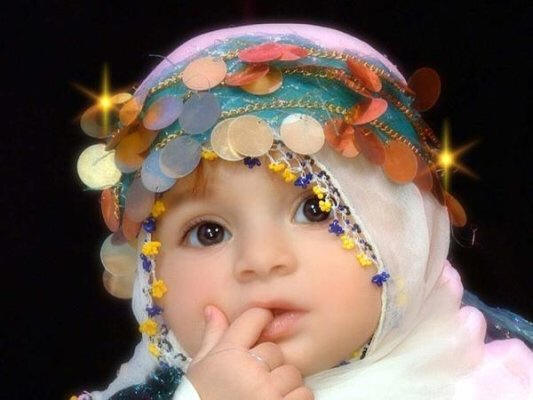
Epitaph for a Palestinian Child
by Michael R. Burch
I lived as best I could, and then I died.
Be careful where you step: the grave is wide.
Christians may want to consider the ethical questions
What does the Bible say?
What would Jesus do? One of the first major revelations in the New Testament
after Pentecost was Saint Peter's vision in which he gained the understanding
that God does not discriminate, and that no person of any race is to be
considered "unclean," lesser or inferior. Jews and Gentiles were the same in the
eyes of God, thus Christians should see Jews and Palestinians as equals in the
brotherhood of man. The early Christian church accepted Peter's revelation, and
from that day forward Palestinians were as welcome as anyone else in a religion
that was supposed to be free of racism.
Gaza
by
Olfa Drid
shelling
shelling
shelling
barren land,
fruitless trees,
wingless birds,
eclipsed sun,
miniscule corpses,
entombed hopes,
decapitated present,
castrated future
death's specter
putrid territories
&
global silence…
"Stripped of our raiment, are we not all the same flesh, the same blood?" As
I sat down to work on this page, these words occurred to me, but when I tried to
locate their source online, I couldn't, so it seems they may have originated from
within me. Still, they seem like good words to begin a dialogue with. If
beauty is only skin deep, our genetic differences may be equally
shallow. Perhaps our differences begin and end with skin tone
and culture. The beautiful Palestinian girl above would be no less beautiful,
and no less human, if she was wearing a baseball cap or Cherokee headdress. And
she certainly doesn't strike me as being a "terrorist," or likely to grow up to
be one. To me she is incredibly lovely and full of promise, and I am reminded
of these lines by the Palestinian poet Fadwa Tuqan about the promise of
spring and the resiliency of life:
When the Tree rises up, the branches
shall flourish green and fresh in the sun
the laughter of the Tree shall leaf
beneath the sun
and birds shall return.
Undoubtedly, the birds shall return.
The birds shall return.
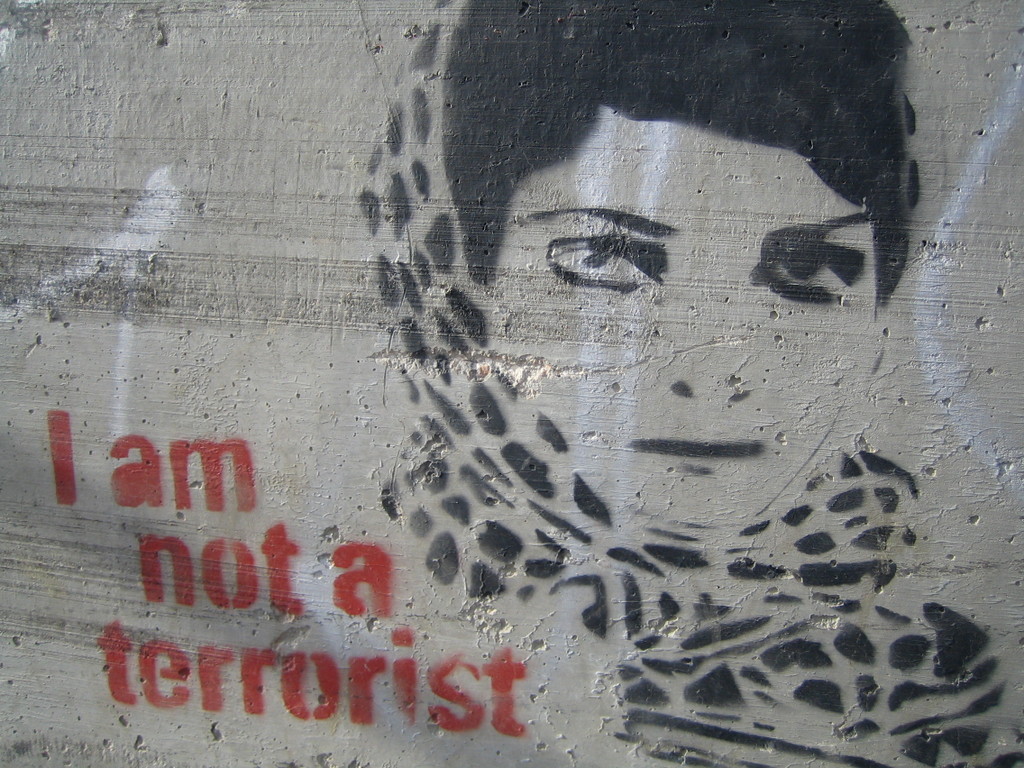
And so, as the world seems to teeter on the brink of World War III, I find
myself asking, "Why?" All the Palestinians I have met personally are people
I am very glad to know. (For
instance, the determined-looking young man below, wearing a Jerusalem t-shirt
and carrying an American flag. I met him at a Freedom Walk in Nashville,
Tennessee.) Why
then is there so much fear and distrust?
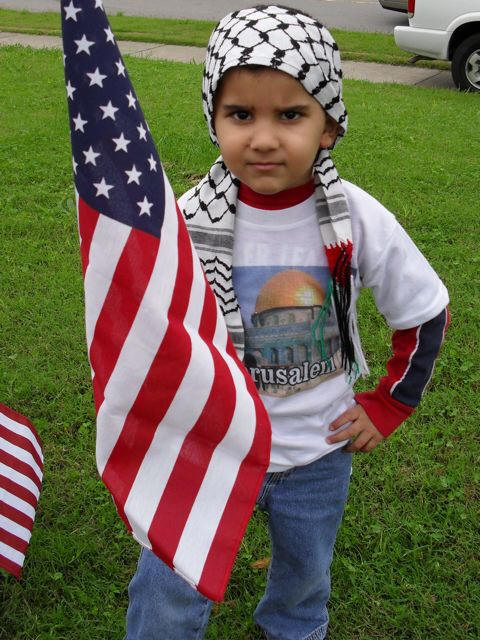
Even if hatred is not the main problem, the
consequences of mutual fear and distrust have been disastrous for the world:
Our distance is frightening:
a distance like the gap between thunderhead and earth
interrupted by bizarre and terrible lightning.
I believe my small poem above may catch something of how many Palestinians must feel about
Americans (although most Americans seem to believe the lightning originated in the
opposite
direction). Each side seems to feel threatened, if not doomed, by the other. But these
lines by Khaled Nusseibeh strike me as being very important:
The oppressed can but pursue suitable tracks
Learning to heed the lessons of awesome war
But will the mighty listen to reason’s voice
That justice will accomplish the peace of Rome?
Or will conscience’s dictates be inexorably ignored
As war’s clouds hover over culture’s great cradle?
And yet we do not harbor the odium of hatred
But pray that peace can still be humanity’s finest hour
After much study and reflection, I have come to the conclusion that
Western interference in the Middle East, and particularly in Palestine,
has created much of the fear and distrust. I'm not sure if most of the people
on either side actually "hate" each other. I hope not. I certainly find it
impossible to "hate" the people whose pictures appear on this page. I met the
girls below at the same Freedom Walk.
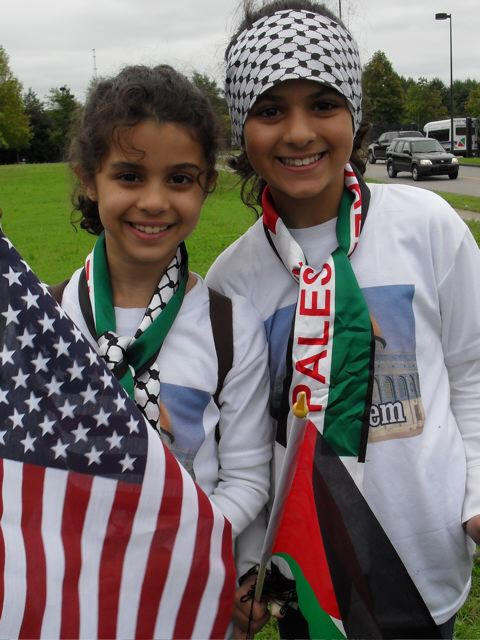
The young man below just might be the cutest walker of them all! I hope I've
made my point. Racial hatred is absurd. If we hate people because they look or
dress different than we do, the problem lies with us, not them. But I don't
believe most Americans "hate" Palestinians. Americans have increasingly been
putting racism in the prehistoric past, where it belongs. So what is the
problem, exactly?
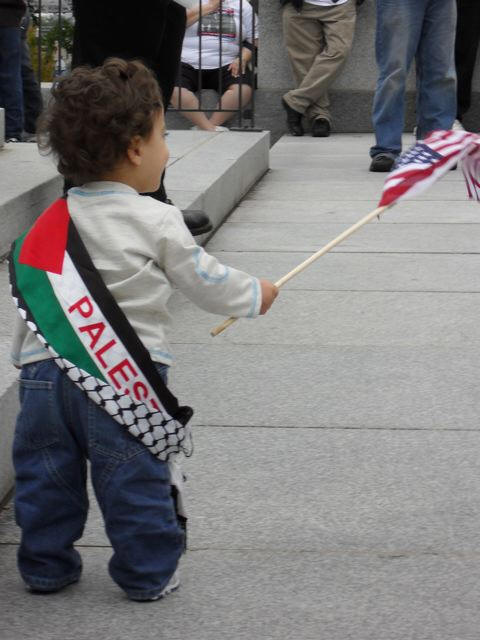
I find the story and words of Mahmoud Darwish, perhaps the most acclaimed of the
Palestinians poets whose words appear on this page, illuminating.
Mahmoud
Darwish was born in the
Galilean village of Barweh, which was razed to the ground
by Israelis during the Nakba (Arabic for "Catastrophe") in 1948, when
Darwish was seven. Like hundreds
of thousands of other Palestinians, Darwish became an exile, along with his
family, because his ancestral village had been destroyed. The title of his
first book, Wingless Sparrows, speaks volumes. And yet Darwish rejected anti-Semitism,
saying:
The accusation is that I hate Jews.
It's not comfortable that they show me
as a devil
and an enemy of Israel.
I am not a lover of Israel, of course.
I have
no reason to be.
But I don't hate Jews.
As a young man, Darwish faced house
arrest and imprisonment because of his political activism. He left Palestine in 1971, to study
briefly at the University of Moscow, after which he worked for a newspaper in Cairo,
then in
Beirut as an editor of Palestinian Issues. When he joined the PLO in
1973, he was banned from reentering Palestine. Still, he recognized the humanity
of the Jews; some were his oppressors, other his lovers:
I will continue to humanise even the enemy . . .
The first teacher who
taught me Hebrew was a Jew.
The first love affair in my life was with a Jewish
girl.
The first judge who sent me to prison was a Jewish woman.
So from the
beginning, I didn't see Jews as devils or angels
but as human beings.
Several of his poems were written for Jewish lovers. He said: "These poems take the side of love, not war."
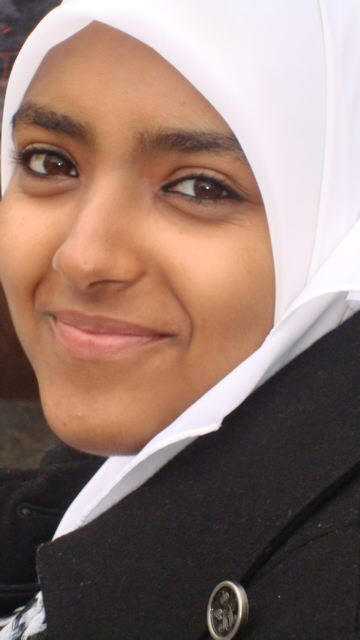
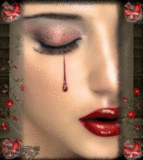
The famous Pax Romana was very precarious, often
bloody, and was not the result of justice, but of the tyranny of military power. The only
lasting peace is a just peace, because injustice invariably leads to violence
on both sides. So when will the mighty listen to reason's voice, and help
establish a just peace? Hopefully beginning now, as we explore the possibility that the Western
world has misjudged and terribly mistreated the Palestinian people. If so,
then perhaps we can begin to
see the inviting form of a just peace. A just peace necessarily begins with
equal human rights, fair laws and fair courts. But the Palestinians
have been denied equal right, fair laws and fair courts for more than sixty
years, ever since the Nakba of 1948. And yet Palestinians still dream of the
land and themselves virtually as one, as in this poem by Fadwa Tuqan:
The Deluge and the Tree
When the hurricane swirled and spread its deluge
of dark evil
onto the good green land
'they' gloated. The western skies
reverberated with joyous accounts:
"The Tree has fallen!
The great trunk is smashed! The hurricane leaves no life
in the Tree!"
Had the Tree really fallen?
Never! Not with our red streams flowing forever,
not while the wine of our thorn limbs
fed the thirsty roots,
Arab roots alive
tunneling deep, deep, into the land!
When the Tree rises up, the branches
shall flourish green and fresh in the sun
the laughter of the Tree shall leaf
beneath the sun
and birds shall return
Undoubtedly, the birds shall return.
The birds shall return.
When I think of the situation of the Palestinians, I think of the movies
"District 9" and "Avatar." The governments of Israel, the United States and the United Kingdom
have colluded to deny the Palestinians their
self-evident rights to self-determination and the protection of fair, nonracist laws and
courts. As an editor and publisher of
Holocaust poetry, I understand how vital it is for human beings—
especially women, children and the elderly—to
be protected by fair laws and fair courts. The Shoah
("Catastrophe") of the Jewish people could not have occurred if they had
been protected by fair laws and courts. The Nakba and the Shoah are two faces of
the same coin: racial injustice. The only nonviolent cures for racial injustice
are equal rights, fair laws and fair courts. Please keep this in mind as we move forward
together. This is one of the simple lessons of history, but Americans have
learned it at home, while ignoring it abroad. We cannot hope for a just peace
until we practice abroad what we preach at home: equal rights, fair laws, and
fair courts. Why has the United States given Israel hundreds of billions of
dollars in financial aid and advanced weapons, when Israel refuses to do what
Americans did when they established equal rights, fair laws and fair courts for everyone?
If you are unfamiliar with the real history of the Israeli/Palestinian conflict,
or have been told that Israel is "only defending itself," please read
Albert Einstein's 1948
letter to the New York Times, then click your browser's "back" button to return to this page.
If you want to understand how the theft of Palestinian land relates to Israel's new offensive
against Gaza, known as Operation "Pillar of Defense" or "Pillar of Clouds," please click here
Amud Annan "Pillar of Fire." If you want to hear the
opinion of the former U.S. president and Nobel Peace Prize laureate who
negotiated peace talks between Israel and Palestinians, please click here
Jimmy Carter:
"Israeli policy is to confiscate Palestinian territory." Please
click here to read about
Israel’s Transfer Committee
and its goal of ethnic cleansing. You may
also want to read and consider
Israeli Prime
Ministers who were Terrorists and
Does Israel Really Want Peace?
It is important for Americans to see the Palestinians as human beings with
self-evident equal rights. Palestinian poets can help us do that. Here is Fadwa
Tuqan again:
Labor Pains
The wind blows the pollen in the night
through ruins of fields and homes.
Earth shivers with love,
with the pain of giving birth,
but the conqueror wants us to believe
stories of submission and surrender.
O Arab Aurora!
Tell the usurper of our land
that childbirth is a force unknown to him,
the pain of a mother’s body,
that the scarred
land
inaugurates life
at the moment of dawn
when the rose of blood
blooms on the wound.
Westerners, and Americans in particular, seem to have become fixated on
terrorism, as if terrorism is the disease itself, rather than a
terrifying symptom of the real disease: rampant racism and injustice being
practiced against an oppressed, largely defenseless people. Mahmoud Darwish is a
voice of love, compassion and reason, asking us to understand young men who have
been driven to martyrdom by despair:
We should not justify suicide bombers.
We are against the suicide bombings,
but we must understand what drives these young people to such actions.
They want
to liberate themselves from such a dark life.
It is not ideological, it is
despair . . .
We have to understand—not justify—what gives rise to this
tragedy.
It's not because they're looking for beautiful virgins in heaven, as Orientalists portray it.
Palestinian people are in love with life.
If we give
them hope—a political solution—they'll stop killing themselves.
In March 2000, Israeli education minister Yossi Sarid proposed that two of
Darwish's poems be taught in Israeli high schools. Prime Minister Ehud Barak
rejected the proposal on the grounds that Israel was "not ready." This
sounds suspiciously like white supremacists saying their children are "not
ready" for the words of Dr. Martin Luther King Jr., or Langston Hughes. No doubt the incident had more to do with Israeli politics
and racism than poetry. I believe it is time for Americans and the rest of the
Western World to accept a simple but hard truth: the Palestinians have been the
victims of rampant hypocrisy and injustice. Why do Americans preach equal rights
and justice to all the world, while refusing to stand for equal rights and
justice for the Palestinians?
The purpose of this page is to allow the Palestinian people, particularly poets,
artists and photographers, to tell their stories in their own words, art and
photographs. Are the beautiful Palestinian children above "terrorists"? Is
the lovely woman below?
Of course not. Are the Palestinians who produce wonderfully moving poems and
exquisite art so different from the rest of the human race, that they
have to be treated as a "special case"? No, self-evidently not. After all, human DNA is virtually
identical. As a leading Internet publisher of Holocaust poetry, I consider it my
duty to tell the other side of the story: the story of the Nakba, but more importantly, the story of a wonderfully diverse and
exceptional people, the Palestinians, who have been treated shamefully,
hypocritically and cruelly by the governments of Israel
and the United States. Let us see the truth for what it is, abandon hypocrisy,
and act responsibly, so that all earth's children are born with equal rights and
the protection of fair laws and fair courts. My son is protected by fair laws
and fair courts. Most Palestinian children are not. That is the real difference:
not the children, but how they are governed. Does any government on earth,
including the government of the United States, have the right to deny Palestinian children
their human rights and dignity? —
Michael R. Burch, editor,
The HyperTexts
Epitaph for a Palestinian Child
by Michael R. Burch, translated by Iqbal Tamimi
مرثية لطفل فلسطيني
عشت قدر استطاعتي، وبعدها متّ
إحذر أين تخطّـو: فالقبر واسع
I lived as best I could, and then I died.
Be careful where you step: the grave is wide.
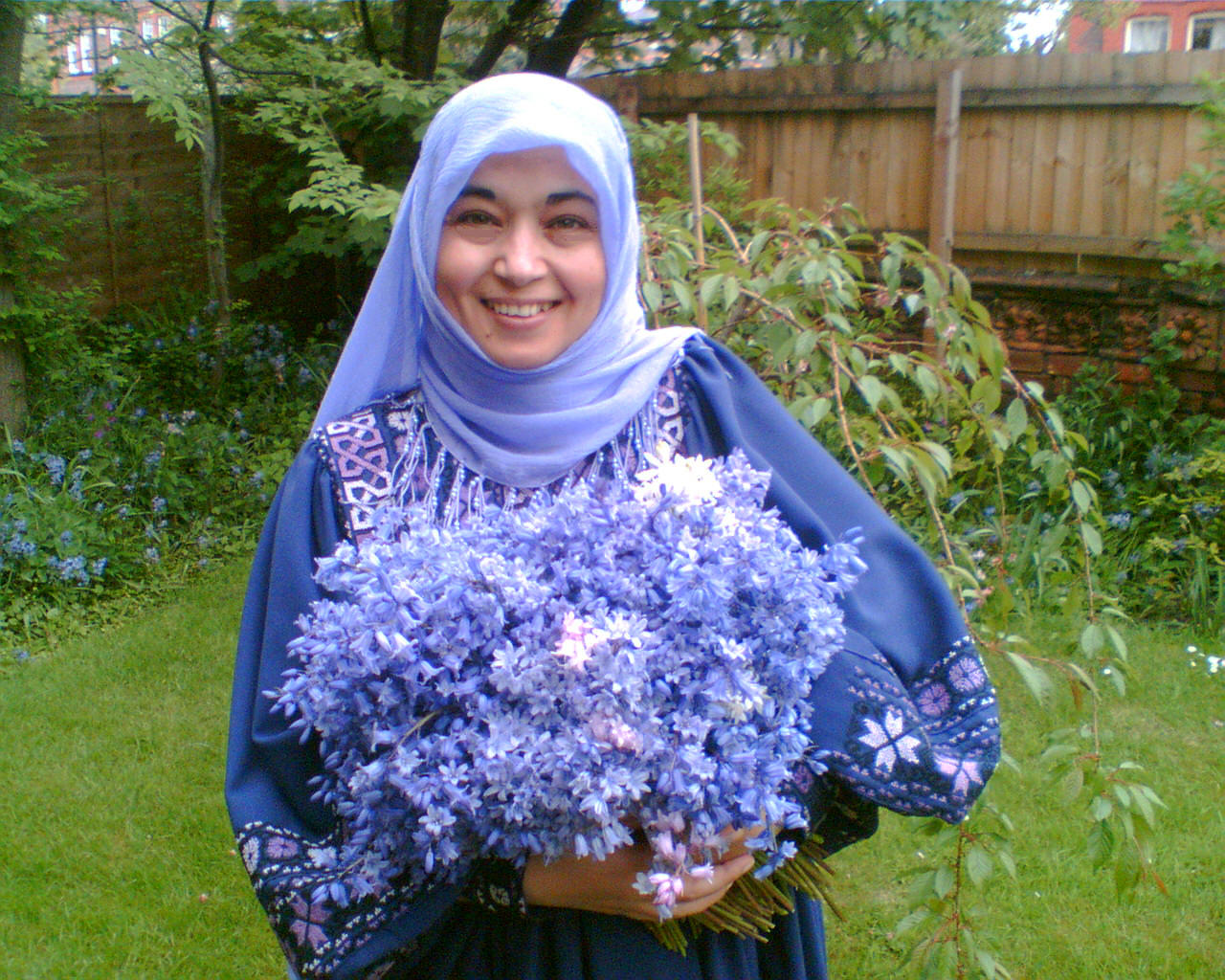
Look at me
by Nahida Izzat
Look at me
I would love to write poetry about love,
Paint rainbows and butterflies,
Smell the scent of pink rose buds,
And dance;
Dance with the melody of jubilant bluebirds
I would love to close my eyes and see children smiling
No guns pointing at their heads
Tell them stories of lily-like fairies in far-away lands
Not of bullets shrieking . . . of missiles exploding
But
How can I?
There is a dagger in my heart
I am hurting
Hurting
I bleed,
I cringe
I cry
HUMANITY, WHERE ARE YOU?
I am being slaughtered
Under your watchful eyes
I am cold . . . cold . . . cold
I cringe
I cry
Humanity, where are you?
Why do you turn your face away?
Why do you keep looking the other way?
I am here
Languishing
In Gaza's
alleyways
Humanity, where are you?
Look at me
See me
I am here
Sighing
In Gaza's
alleyways
I cringe
I cry
Humanity,
Enough turning the other way !
Turning a deaf ear
Turning a blind eye
While I,
and oh ! my poor children
Die
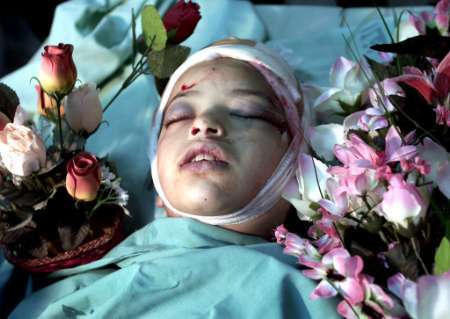
Walid Khazindar was born in 1950 in Gaza City.
He obtained a law degree in Beirut
in 1978. He is considered one of the best Palestinian poets; his poetry is
characterized by metaphoric originality and a novel thematic approach
unprecedented in Arabic poetry. He was awarded the first Palestine Prize for
Poetry in 1997. He lives in Tunis.
Distant light
Harsh and cold
autumn holds to it our naked trees:
If only you would free, at least, the sparrows
from the tips of your fingers
and release a smile, a small smile
from the imprisoned cry I see.
Sing! Can we sing
as if we were light, hand in hand
sheltered in shade, under a strong sun?
Will you remain, this way
stoking the fire, more beautiful than necessary, and
quiet?
Darkness intensifies
and the distant light is our only consolation —
that one, which from the beginning
has, little by little, been flickering
and is now about to go out.
Come to me. Closer and closer.
I don't want to know my hand from yours.
And let's beware of sleep, lest the snow smother us.
Translated by Khaled Mattawa from the author's collections
Ghuruf Ta'isha (Dar al-Fikr, Beirut, 1992) and Satwat al-Masa
(Dar Bissan, Beirut, 1996). Reprinted from Banipal No 6.
© Translation copyright Banipal and translator. All rights reserved.
And here is a poem by Dr. Hanan Ashrawi that gives us a child's
perspective on the Israeli occupation of Palestine:
Hadeel's Song
Some words are hard to pronounce—
He-li-cop-ter
is most vexing
(A-pa-che or Co-bra is impossible)
But how it can stand still in the sky
I cannot understand—
What holds it up
What bears its weight
(Not clouds, I know)
It sends a flashing light—so smooth—
It makes a deafening sound
The house shakes
(There are holes in the wall by my bed)
Flash-boom-light-sound—
And I have a hard time sleeping
(I felt ashamed when I wet my bed, but no one scolded me).
Plane—a word much easier to say—
It flies, tayyara,
My mother told me
A word must have a meaning
A name must have a meaning
Like mine,
(Hadeel, the cooing of the dove)
Tanks, though, make a different sound
They shudder when they shoot
Dabbabeh is a heavy word
As
heavy as its meaning.
Hadeel—the dove—she coos
Tayyara—she flies
Dabbabeh—she crawls
My Mother—she cries
And cries and cries
My Brother—Rami—he lies
DEAD
And lies and lies, his eyes
Closed.
Hit by a bullet in the head
(bullet is a female lead—rasasa—she kills,
my pencil is a male lead—rasas—he writes)
What’s the difference between a shell and a bullet?
(What’s five-hundred-milli-meter-
Or eight-hundred-milli-meter-shell?)
Numbers are more vexing than words—
I count to ten, then ten-and-one, ten-and-two
But what happens after ten-and-ten,
How should I know?
Rami, my brother, was one
Of hundreds killed—
They say thousands are hurt,
But which is more
A hundred or a thousand (miyyeh or alf)
I cannot tell—
So big—so large—so huge—
Too many, too much.
Palestine—Falasteen—I’m used to,
It’s not so hard to say,
It means we’re here—to stay—
Even though the place is hard
On kids and mothers too
For soldiers shoot
And airplanes shell
And tanks boom
And tear gas makes you cry
(Though I don’t think it’s tear gas that makes my mother cry)
I’d better go and hug her
Sit in her lap a while
Touch her face (my fingers wet)
Look in her eyes
Until I see myself again
A girl within her mother’s sight.
If words have meaning, Mama,
What is Is-ra-el?
What does a word mean
if it is mixed
with another—
If all soldiers, tanks, planes and guns are
Is-ra-el-i
What are they doing here
In a place I know
In a word I know—(Palestine)
In a life that I no longer know?
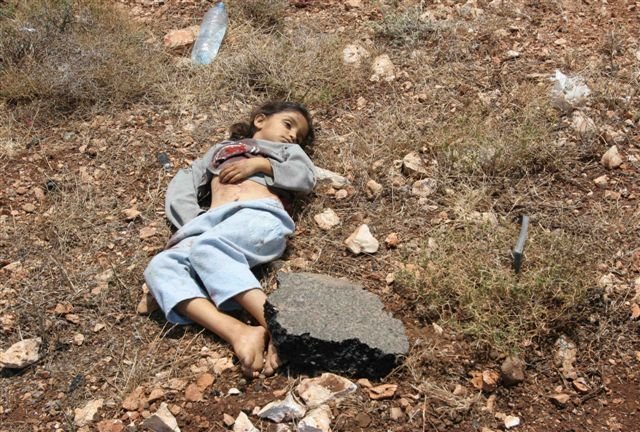
Excerpts from Under Siege
by
Mahmoud
Darwish
translated by Marjolijn De Jager
Here on the slopes of hills, facing the dusk and the
cannon of time
Close to the gardens of broken shadows,
We do what prisoners do,
And what the jobless do:
We cultivate hope.
A country preparing for dawn. We grow less intelligent
For we closely watch the hour of victory:
No night in our night lit up by the shelling
Our enemies are watchful and light the light for us
In the darkness of cellars.
Here there is no "I".
Here Adam remembers the dust of his clay.
You who stand in the doorway, come in,
Drink Arabic coffee with us
And you will sense that you are men like us
You who stand in the doorways of houses
Come out of our morningtimes,
We shall feel reassured to be
Men like you!
When the planes disappear, the white, white doves
Fly off and wash the cheeks of heaven
With unbound wings taking radiance back again, taking
possession
Of the ether and of play. Higher, higher still, the
white, white doves
Fly off. Ah, if only the sky
Were real [a man passing between two bombs said to me].
Cypresses behind the soldiers, minarets protecting
The sky from collapse. Behind the hedge of steel
Soldiers piss—under the watchful eye of a tank—
And the autumnal day ends its golden wandering in
A street as wide as a church after Sunday mass . . .
[To a killer] If you had contemplated the victim’s face
And thought it through, you would have remembered your
mother in the
Gas chamber, you would have been freed from the reason
for the rifle
And you would have changed your mind: this is not the
way
to find one’s identity again.
The siege is a waiting period
Waiting on the tilted ladder in the middle of the storm.
Alone, we are alone as far down as the sediment
Were it not for the visits of the rainbows.
We have brothers behind this expanse.
Excellent brothers. They love us. They watch us and
weep.
Then, in secret, they tell each other:
"Ah! if this siege had been declared . . . " They do not
finish their sentence:
"Don’t abandon us, don’t leave us."
Our losses: between two and eight martyrs each day.
And ten wounded.
And twenty homes.
And fifty olive trees . . .
Added to this the structural flaw that
Will arrive at the poem, the play, and the unfinished
canvas.
Oh watchmen! Are you not weary
Of lying in wait for the light in our salt
And of the incandescence of the rose in our wound
Are you not weary, oh watchmen?
A little of this absolute and blue infinity
Would be enough
To lighten the burden of these times
And to cleanse the mire of this place.
In the state of siege, time becomes space
Transfixed in its eternity
In the state of siege, space becomes time
That has missed its yesterday and its tomorrow.
The martyr encircles me every time I live a new day
And questions me: Where were you? Take every word
You have given me back to the dictionaries
And relieve the sleepers from the echo’s buzz.
The martyr enlightens me: beyond the expanse
I did not look
For the virgins of immortality for I love life
On earth, amid fig trees and pines,
But I cannot reach it, and then, too, I took aim at it
With my last possession: the blood in the body of azure.
The siege will last in order to convince us we must
choose an enslavement that does no harm, in fullest liberty!
Resisting means assuring oneself of the heart’s health,
The health of the testicles and of your tenacious
disease:
The disease of hope.
Greetings to the one who shares with me an attention to
The drunkenness of light, the light of the butterfly, in
the
Blackness of this tunnel!
Greetings to the one who shares my glass with me
In the denseness of a night outflanking the two spaces:
Greetings to my apparition.
My friends are always preparing a farewell feast for me,
A soothing grave in the shade of oak trees
A marble epitaph of time
And always I anticipate them at the funeral:
Who then has died . . . who?
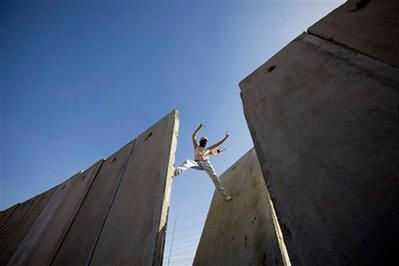
Ahmad Al-Za’tar
by
Mahmoud
Darwish
translated by Tania Nasir
For two hands, of stone and of thyme
I dedicate this song. For Ahmad, forgotten between two
butterflies
The clouds are gone and have left me homeless, and
The mountains have flung their mantles and concealed me
From the oozing old wound to the contours of the land
I descend, and
The year marked the separation of the sea from the
cities of ash, and
I was alone
Again alone
O alone? And Ahmad
Between two bullets was the exile of the sea
A camp grows and gives birth to fighters and to thyme
And an arm becomes strong in forgetfulness
Memory comes from trains that have left and
Platforms that are empty of welcome and of jasmine
In cars, in the landscape of the sea, in the intimate
nights of prison cells
In quick liaisons and in the search for truth was
The discovery of self
In every thing, Ahmad found his opposite
For twenty years he was asking
For twenty years he was wandering
For twenty years, and for moments only, his mother gave
him birth
In a vessel of banana leaves
And departed
He seeks an identity and is struck by the volcano
The clouds are gone and have left me homeless, and
The mountains have flung their mantles and concealed me
I am Ahmad the Arab, he said
I am the bullets, the oranges and the memory
Dead Life
by
Olfa Drid
Hey you, hurrying off to the doctor in case of flu or toothache,
what if you suffered like the people of Gaza from a chronic heartache?
Hey you, your kids have a lot of toys to play with and change their moods,
but kids like them in Gaza are being robbed of their innocent moments of
childhood!
Hey you, your kids are lucky enjoying food, shelter and comfy beds,
but parents in Gaza are traumatized by their kids' exploded stomachs and
heads!
Hey you, you're showing off your new brand-name clothes to your peers?
For their lifelong 'red uniforms', kids of Gaza are drenched in tears!
Hey you, you're complaining every now and then about a lack of fun?
What if your ears were deafened by the noise of rockets and guns!
Hey you, you shout and swear if your kids fall or bleed somewhere?
People of Gaza have been bleeding in silence for decades, as if No one does care!
Hey you, you feel humiliated if you don't celebrate your birthday every year
with friends, candles and a cake?
People of Gaza have only wakes and are burning candles daily for their land's
sake!
Hey you, you listen to music to calm down and release your stress?
People of Gaza have no other melody but the melancholic lyric of death!
Hey you, you're enraged because your lover didn't call you on the phone?
People of Gaza can only express their displeasure with a stone!
Hey you, you're reluctant to see horrible pictures of atrocities and scattered
body parts?
Will you survive a minute if your eyes witness your family members literally
falling apart?
Hey you, you're enjoying beer, marijuana and secret dating on Twitter and
Facebook?
Did you also swallow all the anesthetizing pills and poisoned hooks?
Hey you, you're hypnotized by the wide range of drama, thriller, soccer and porn
TV channels?
Why don't you become a pioneer in launching soul-uplifting,
intelligence-boosting and peace-promoting panels?
Hey you, do you feel frustrated when you miss a party or a famous star's show?
What if you lived a life where the sun never rises to melt the years of snow?
Hey you over there, proud of having two feet not four,
What makes you feel superior,
if your brain is (b)locked,
your tongue is tied and
your heart is congealed to the core?
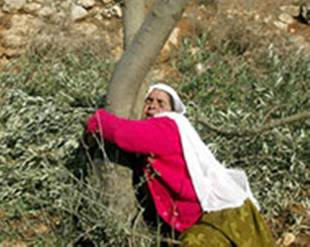
Stones that sprouted legs
by
Iqbal Tamimi
Written for the memory of my Iraqi colleague
Atwar Bahjat who was killed while reporting from Iraq.
The bed of defeat has always been feminine.
Ever since the sky was within reach
a woman fluffing a wombless vanilla pillow
has given birth to scandals.
The thorns took advantage,
climbing the shoulders of the bare peach,
stealing the bride
whose perfume never swirled in the wind.
The apple went mad,
glued in his grief
to the fingers of his land.
Stripping off his desire
He shouted, cried,
"I’ve perfected banging water drums
because my share of plight is
exactly like yours,
although my teardrops
could quench hatred’s fire."
We all perfected the game
attacking the features of things.
We dallied with the nails of our jailer
who bought the East
sometimes with prayers,
at other times
with a convoy of female slaves.
The knight of the mountains
has been collecting our wounds
to sprinkle them on a heap of dew.
He waited a long time
until the stones sprouted legs,
chasing the mud groom
who tested the virginity of the heavens,
bearing his imported season
on the shoulders of winter.
I screamed into his shirt,
"Rescue me please, from this cold body.
My circle has been defeated by armies of frost,
chased by eagles of dust.
Toss your body
against the ink lorry,
Drown your sorrow in a cup of coffee or . . .
die standing up like a wall:
defend the hymen of the thyme;
defend a wagon
ready to load the victims of
terror.
Fight for
honey-flavoured Poems,
document your defeat . . . if you
choose
on a sobbing poem.
For a lilac became a naked martyr
in becoming a trembling pavement for a camera crew."
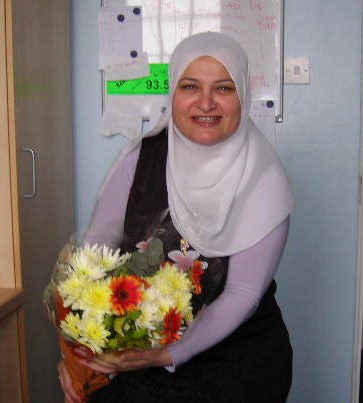
Palestinian poet Iqbal Tamimi (above)
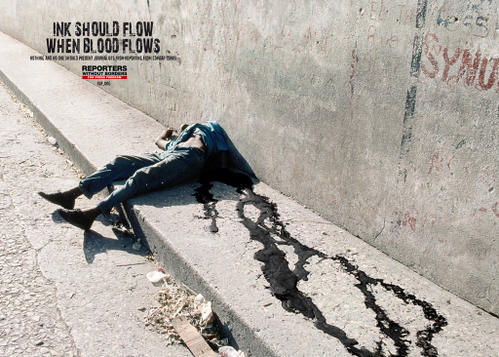
Murdered by my own ink
by
Iqbal Tamimi
The ports of my papers,
are fields of uncertainties.
I plant my anchor
to secure my old face
while it ages toward oblivion.
My dream is stretching
between a place
under the umbrella of the wind,
and
an illusion under the rain.
The distance
is . . . too far
to arrest the dead man,
who crucified me
in a hideous, unthinkable moment.
I am just a number within an army
of unlucky ones,
killed by the poison of their own ink,
and the stupidity of their own fingers,
slaughtered by despair.
Our traps
race us in our sleep,
to attend a wedding
between the rain and the desert.
Our pains . . . twitter
While we assassinate ourselves,
hoping some one;
not one of us
will rise
to write a better dirge
while watching the skittering feet of the poor
following their own footprints,
forgetting the phantoms behind,
to the side,
on some other route,
swarming with the dust of honor,
as we abandon our bevy
to increase our number
by . . . one.
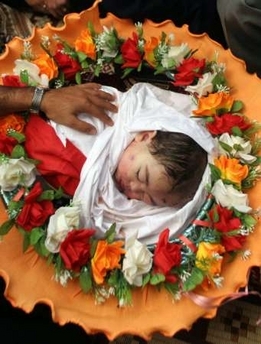
Armed with a prayer
by
Iqbal Tamimi
Once upon a crime,
the night
hijacked the face of my homeland.
The next day,
the spring was pronounced dead.
My blood
lost its way rivuletting through sand.
I was not courageous enough
to declare
the theft of my skin;
It was stretched by loathsome hands
to create a new face for an old drum.
There . . .
sat my anxiety
on the banks of pain,
washing my punctured voice,
asking me
how would I . . .
fish for my poem’s crumbs in a mine field?
What could I say?
For . . .
I had lost the dawn in the market,
my mouth was stuffed
with the sweat of my exile,
nothing of me remained
but
my few half-living fingers
exhuming the guts of lines,
a nose . . .
striving hard to find its way home,
and a pair of eyes,
that looked but could not see
any
of the absent loved ones,
who used to be there for me.
My pulse was swinging,
documenting my name,
alongside others hanging
on the verge of plight.
My loaf was naked.
I was armed only with a prayer.
A child beneath the rubble
Screamed, calling my name
Mama . . . Please . . .
tell them not to execute my kite.
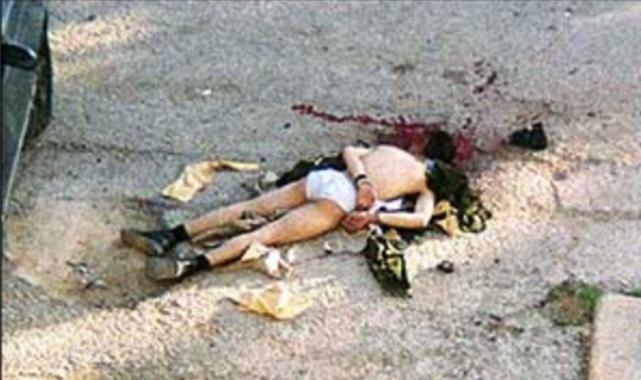
Hidden dimensions
by Nahida Izzat
My first son Hassan
Was born on April the 9th
You might think
So what … why are you saying it
With such a gloomy tune
What is wrong with the 9th of April?
You have to be a Palestinian
To understand
For on the 9th of April 1948
The massacre of Deir Yassin
Took place
Where every man women and child
Of that peaceful farming village
Was killed in cold blood
No one survived
Except those
Who pretended to be dead
As we celebrate the birth of a newborn
With joy
We mourn and grieve
Lost loved ones
In our midst
Nothing becomes insular
Nothing is disjointed
No single colours
The fabric of our lives
Makes the most amazing tapestry
If you hold it backwards
Looking at the wrong side
You’ll see a mirror image
Of shades of a blurred picture
With loops . . . knots and fraying thread
If you turn it over
It looks much neater
But still you can’t actually see
The full picture
Only colours and shadows
But hey . . . take a little time
And walk backwards
Further back
Look at the tapestry
From a distance
You will be amazed
At its outstanding beauty
All these murky shades
That didn’t make sense to you
Even disturbed you
When you were near
From afar
These dark shadows
Are precisely what makes this piece
So unique
So spectacular
These unfathomable hues
Are what give our life portrait
Its depth
And hidden dimensions
Since that day of 1948
Many . . . many babies were born
On April the 9th
Our joys are always stained
With hints of sorrow
Our sadness is always coloured
With hues of hope
Without which
The tapestry of our lives
Will never be complete
Won’t be as rich
Or as beautiful
Don’t waste much time
Staring at the wrong side with fury
Turn it over . . .walk further back . . . and feel the glory
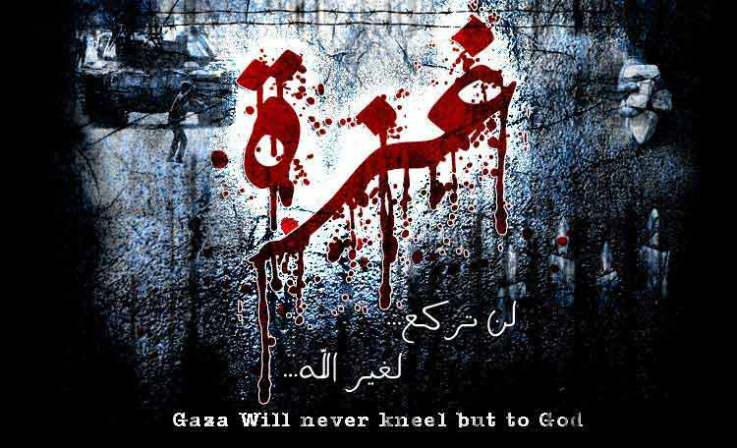
Apollyon I - Night of the Apocalypse
by Nakba
His eyes meet mine with blank incomprehension.
How did you come, my friend, to harm this child?
"She was not mine, and no report’s been filed.
So what, old chum?" (Strange lines beyond my scansion.)
A girl so sweet, if woebegone?
Why, surely she was everyone’s!
He lifts his eyes, shifts, sighs, spits, unbeguiled.
He does not know that I have come to judge him.
"What’s it to you?" he threatens, with a leer.
She was my child.
"That thing defiled?"
Ten trillion wavering stars blink, disappear.
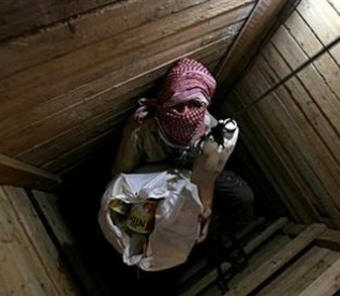
Her Slender Arm
by Nakba
Her slender arm, her slender arm,
I see it reaching out to me!—
wan, vulnerable, without a charm
or amulet to guard it. Flee!
I scream at her in wild distress.
She chides me with defiant eyes.
Where shall I go? They scream, "Confess!
Confess yourself, your children lice,
your husband mantis, all your kind
unfit to live!"
See, or be blind.
I cannot see beyond the gloom
that shrouds her in their terrible dungeon.
I only see the nightmare room,
the implements of torture.
Sudden
shocks contort her slender frame!
She screams, I scream, we scream in pain!
I sense the shadow-men, insane,
who gibber, drooling, Why are you
not just like US, the Chosen Few?
Suddenly she stares through me
and suddenly I understand:
I hear the awful litany
of names I voted for. My hand
lies firmly on the implement
they plan to use, next, on her children
who huddle in the corner. Bent,
their bidden pawn, I heil Amen!
to their least wish. I hone the blade
"Made in America," their slave.
She has no words, but only tears.
I turn and retch. I vomit bile.
I hear the shadow men’s cruel jeers.
I sense, I feel their knowing smile.
I paid for this. I built this place.
The little that she had, they took
at my expense. Now they erase
her family from life’s tattered book.
I cannot meet her eyes again.
I stand one with the shadow men.
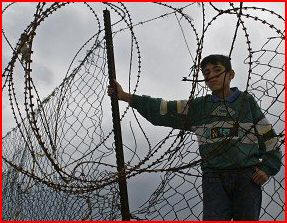
Suffer the Little Children
by Nakba
I saw the carnage . . .
saw girls' dreaming heads
blown to red atoms,
and their dreams with them . . .
saw babies liquefied
in burning beds
as, horrified,
I heard their murderers’ phlegm . . .
I saw my mother stitch
my shroud’s black hem,
for in that moment
I was one of them . . .
I saw our Father’s eyes
grow hard and bleak
to see frail roses severed at the stem . . .
How could I fail to speak?
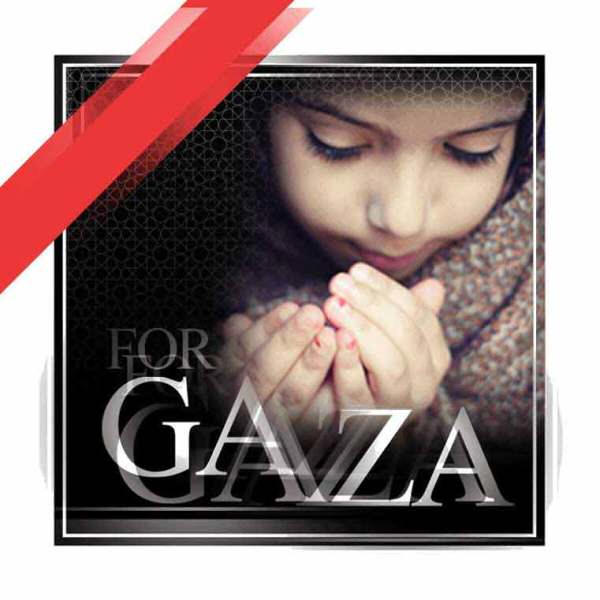
Lines for a Palestinian Mother and Child
by Nakba
I swear her eyes were gentle . . . that she was
a child herself, although she bore a child
close to her breast, her one and only cause.
I watched in apprehension as men filed
in close, goose-stepping ranks on either side,
as if they longed for blood, on Eastertide.
I thought of women slain for being born
the wrong race, sex, caste, or the wrong religion.
I thought of Joan of Arc, her tunic torn,
her breasts exposed, her bloody Inquisition.
I felt the flames and then her screams explode.
I thought of Mary and her dolorous road.
When will religion learn men must repent
of killing even one mild innocent—
both
before and after Lent?
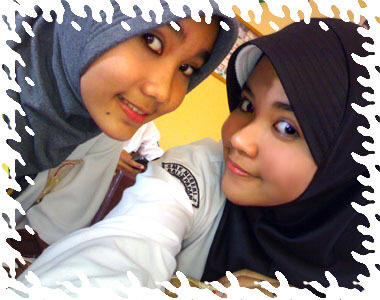
The Least of These
by Nakba
Here lies a child of the Holocaust.
Here all her bright dreams lie buried, unknown . . .
lie buried, unlived. And who knows the cost?
No roses grow here by this stone
stark as bone.
"Dearly Beloved," her white marker reads,
as many bright sermons on Love have begun,
but this is her end. She lies among weeds
more somber than widows’,
six feet from the sun.
Whom shall we cherish? O, whom shall we love?
The war profiteer, or the peaceable dove?
"Made in America," the Cruise Line is read:
now Palestine’s dove lies here—cold, shattered, dead.
Here lie her pieces. Friend, read them, and weep.
Scream blindly for justice, or blind, away creep!
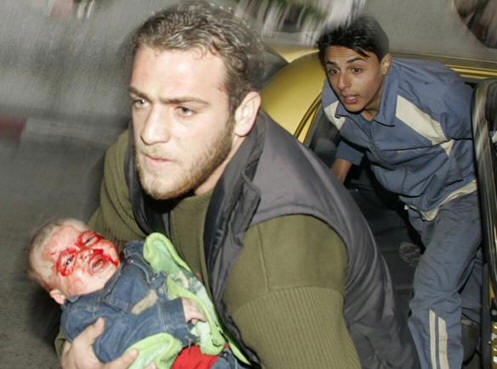
In her dread repose (I)
by Nakba
Find in her pallid, dread repose—
no hope, alas!, for the Rose.
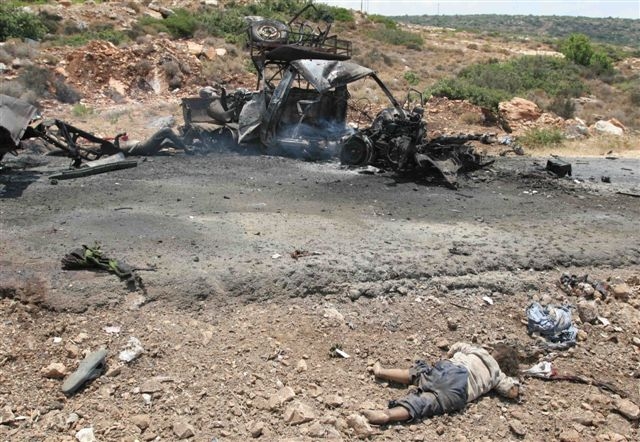
In her dread repose (II)
by
Nakba
Find in her pallid, dread repose—
no hope for the World. O, my violated Rose!
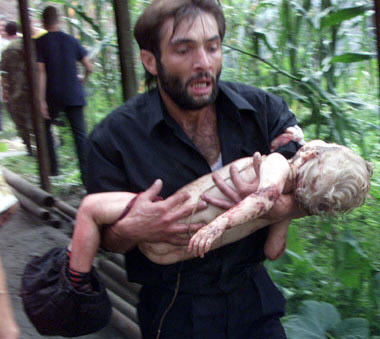
The Horror
by
Nakba
the Horror is a child who died because
we closed our eyes to simple Nature’s laws,
who knows no justice, but red fangs and claws
the Horror is the child we led to stray
into dark wilds where evil Men hold sway,
then abandoned her, and swiftly walked away
now she lies dead, and many innocents!
the Tiger prowls; He longs to kill; He pants
for blood; before Him, children die like ants
the Tiger rules by Law, red Claw and Tooth,
while Barnums laugh, count Beans, and sip Vermouth.
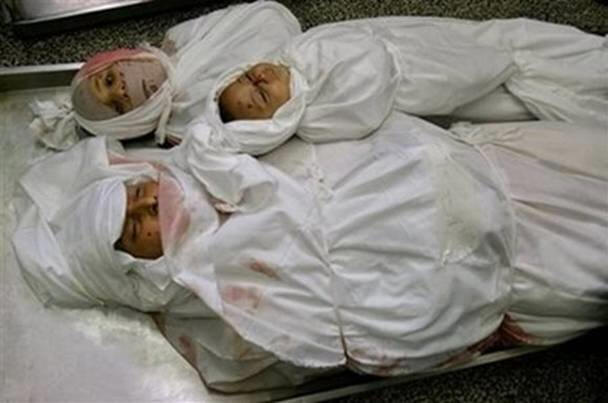
Lockheed, Take Heed
by
Nakba
Terror fell upon my children. Wailing,
they ran toward my arms—small, pale with fright.
They seemed eternities from me—so distant!
Their day exploded. Now I live in night.
"Made in America." I find that tragic.
Though far less tragic than my sweet doves, blown
to atoms by your profits’ ill-bought magic.
Land of the "brave," the "free"? Brave freedom’s flown
to heights unknown—too high to see my people
crushed in the dust by those you love so well.
Sing hymns. Praise God. Erect some higher steeple.
Condemn my kind to poverty, and hell.
"Shock and awe?" Yes, I feel awe—and shock.
You jackals killed my doves, my lambs, my flock!
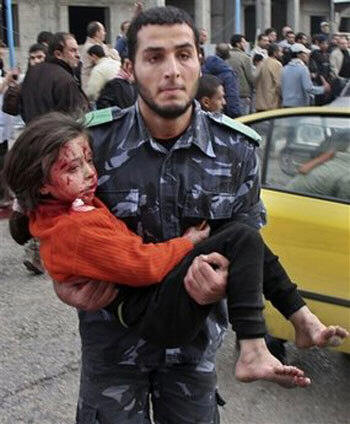
The BOSS
by Nakba
In 1948,
crying "Holocaust!"
the Jews became the keepers
and mad sweepers of the lost
Palestinian nation,
while every American "Christian"
wept with great elation
to see Yahweh’s "salvation."
He’s the BOSS!
Though He couldn’t take on Hitler,
though Himmler had Him harried,
though Goering had Him groping
for answers—yes, and worried—
though Mengele had mangled
the fairest and the brightest
of all His chosen tribes
and those with whom He’s tightest . . .
He’s the BOSS!
Forget all human justice.
Forget about two wrongs.
Just ply the LORD with money,
pleas, prayers and fervent songs.
Then let the children suffer
and let the strong run wild.
You’re in with heaven’s Duffer!
Your prayers have Him beguiled!
So ... You’re the BOSS!
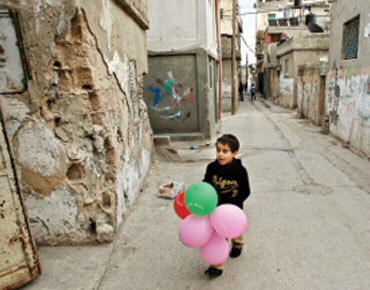
US Schoolboys
by Nakba
The simple path to peace
begins with a simple step,
as the sun breaks bright to the East
though the schoolboy has long overslept.
O, when will he rise and yawn!
Will he miss how dew spangles the lawn?
The simple path begins
when the schoolboy repents of his sins,
for his balmy vacation’s long over.
There’s no time to be lolling in clover!
Now that the day has begun,
he must rise in accord with the sun.
The path is called Justice . . . and now
he must walk it, and stoutly avow
to follow wherever it leads
till the sun sets blaze to the weeds . . .
he must thresh, so his brothers can find
peace’s path, though the world seems blind.
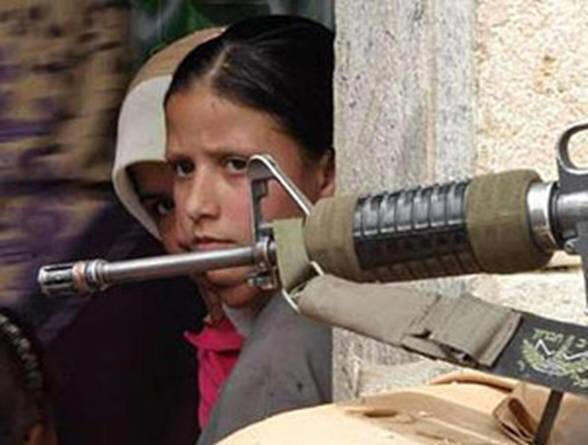
I Saw
by Nakba
I saw the carnage . . .
saw their dreaming heads
blown to red atoms,
and their dreams with them.
I saw their fathers’ eyes
grow hard and bleak,
as did my own.
I heard their murderers’ phlegm.
I saw them in my dreams;
my knees grew weak . . .
for in that moment I was one of them . . .
How could I fail to speak?

Stampede
by Nakba
I dreamt last night I was a Palestinian
herded like a cow or a defeated Indian
down some new Trail of Tears, into Gaza’s corral.
And I dreamt that you watched me
from the highest Wall.
I dreamt the whip cracked; how it bit my flesh!
I was gaunter than the skeletons of Bangladesh.
But I stood straight, upright. I refused to fall.
And I dreamt that you watched me
from the highest Wall.
I screamed aloud, but I refused to break
though my geysering blood created red lakes.
My oppressors laughed, Nazis!, but I stood tall.
And I dreamt that you watched me
from the highest Wall.
O, when will you see me, and meet my eye?
O, when will you hear me, and regard my cry?
You put me here. You helped build this cursed Wall
with your nickels and your dimes and your pious calls
for "democracy" and "freedom." How your voice appalls!
Now we all mill here like cattle, in our abattoir stalls.
It was you who interred us. Please, before it’s too late,
break down the fucking wall, fling open hell’s gate!
Amen
Nathalie Handal
Nathalie Handal has lived in the United States, Europe, the Caribbean, and has
traveled extensively in the Middle East and Eastern Europe. She is a poet, writer, playwright, editor and literary
researcher. Her work has appeared in numerous magazines and literary journals
worldwide. Handal has also interviewed numerous writers including Allen
Ginsberg, Charles Simic and Mahmoud Darwish. She has read/performed poetry and
given talks on Arab-American and Ethnic-American literature and theatre in the United States, Europe, and the Arab world. She is the author of the
poetry book, The NeverField, a poetry CD, Traveling Rooms, and
the editor of The Poetry of Arab Women: A Contemporary Anthology, an
Academy of American Poets bestseller. Handal is presently editing two
anthologies, Arab-American Literature and Dominican Literature
and co-editing along with Tina Chang and Ravi Shankar, Risen from East: An
Anthology of South Asian, East Asian and Middle Eastern Poets. She is
finishing a play, The Raining Room and her poetry book, Strangers
Inside Me, is forthcoming.
Jenin
A night without a blanket, a blanket
belonging to someone else, someone
else living in our homes.
All I want is the quietness of blame to leave,
the words from dying tongues to fall,
all I want is to see a row of olive trees,
a field of tulips, to forget
the maze of intestines, the dried corners
of a soldier's mouth, all I want is for
the small black eyed child to stop
wondering when the fever will stop
the noise will stop, all I want is
a loaf of bread, some water
and help for the stranger's torn arm,
all I want is what we have inherited
from the doves, a perfect line of white,
but a question still haunts me at night:
where are the bodies?
Bethlehem
Secrets live in the space between our footsteps.
The words of my grandfather echoed in my dreams,
as the years kept his beads and town.
I saw Bethlehem, all in dust, an empty town
with a torn piece of newspaper lost in its narrow streets.
Where could everyone be? Graffiti and stones answered.
And where was the real Bethlehem—the one my grandfather came from?
Handkerchiefs dried the pain from my hands. Olive trees and tears continued to remember.
I walked the town until I reached an old Arab man dressed in a white robe.
I stopped him and asked, "Aren't you the man I saw in my grandfather's stories?"
He looked at me and left. I followed him—asked him why he left?
He continued walking. I stopped, turned around and realized
he had left me the secrets in the space between his footsteps.
Excerpts from Jerusalem is Arab Nationalism's Bride
by Muzaffer Al Nawwab
Oh my country, exhibited at the market as a morning star
They are lamenting you in the night brothels
And some revolutionaries are perfecting their manhood
Joggling at the noise of the drum and trumpet
Those are your enemies, my country
Who sold Palestine other than your enemies, O my country?
Who by God, sold Palestine and accumulated such wealth
Other than the list of beggars at the ruler's thresholds
And at the Great Powers' tables?
As soon as the night puts on its veils
The cups crack avowing Jerusalem is your Arab Nationalism's Bride
Ahlan (welcome) ... Ahlan (welcome)
Who sold Palestine other than the pen's revolutionaries?
I have sworn by the bottlenecks of wine, though the cup is full only of
Poison
I have sworn by the history of starvation and the day of famine
Not a single Arab would ever last if we remained in this
Predicament
Among the profiteering rulers
Jerusalem is the bride of your Arab Nationalism
Why did you bring to her room all the night's adulterers
While you remained behind the doors eavesdropping
Hearing the screams of her virginity
Then you drew all your daggers, bragging
Yelling at her to hush lest her honor be blemished
I am not shy when I speak out frankly of your reality
That a yard of hogs is much cleaner than all of you
May the bench of washing the dead move,
But you are immovable
Now I expose, undress you
In all the capitals of this Arab World
You have killed my gaiety
In every alley I see al-Azlam (the idols) Amami (before me)
Till I began avoiding even the phone
Even the walls and even the children
Vomiting for this crude method
Let us sit before the feet of the Arabian Desert
To let her pass judgment on us
I admit before the Desert
That I am as banal, scoundrel and sad
As your defeat
O defeated honorable men
O defeated rulers
O defeated people
How dirty, how dirty, how dirty we are.
How dirty we are,
I don't exclude any one.
Taher Riyad
Riyad was born in 1956 in Amman and was unable to finish his University
education because of financial difficulties. He has translated works by Elliot,
Becket, Dylan Thomas and others into Arabic. Riyad participated in poetry
festivals all over the Arab world. His work is featured in Bruta's poetry
selection "Poets of the End of the Century". Riyad is co-director of a
publishing house in Jordan, and has published a number of poetry collections.
His works are considered to be among the most original, combining the eloquence
of classical poetry and the innovation of modernist Arabic poetry.
From "Signs"
I .
I am not the shade who upholds the bare tree
against its dissolution,
I'm not hunger to strap stones round my belly and suck
your emaciated breast.
I am think like the figure of fear,
I contain the thirst of embers
to transform themselves back to branches,
I do not pray for what's to come
—nothing will come—
and I don't concede to reverence.
It is a chain of ants that raised this earth
and now erodes it slowly.
II.
Your face is purer than the mirror,
luxurious and more eager.
Colours rejoice around your head, rejoice
and Ah , they suffer.
Offer death a libation for the past,
it may accept and stay.
And it's the same: your destroying a lover
or your destroying things out of love.
Now the mirror's clouded for you; break it
and say: "My eyes see better ."
III.
I just forgot
nothing more
I forgot
the salt of creation scorches my eyes
and the sand of insomnia
I try to remember:
Does water describe the shape of fountains,
their pattern of fluidity ,
and indicate the day's greenness,
or does water have
the shape of drowning ?
IV. Rejoice twice:
when you see the sand turn wet and soft
and when it becomes water
Twice rejoice:
tomorrow will be overcast
and shade compose a sky
And hide just once
for a scoundrel might inherit the earth
and scratch the living.
May Sayigh
Sayigh was born in 1940 in Gaza. She obtained in BA in sociology from Cairo
University. She was the president of the Union of Palestinian Women and has been
very active in the cause of Palestinian women. She has published a number of
poetry collections, as well as a prose account of the 1982 Israeli invasion of
Lebanon in "The Siege". She lives in Paris.
Departure
In this moment of departure,
point your red arrows,
disarm the lightning, and open wide
the gate to my exile.
Close the sky's open face, and ride away.
I long so deeply that the shores unfold their seas
and horses bolt!
Now I'll carry the roads and palm trees in my suitcase,
I'll lock my tears in the evening's copybooks
and seal the seasons.
Let's begin our song: here is Beirut wearing you
like her own clothes.
You must sit well on the surface of her glory
abandoning tears
In her blue froth
She contains you like eternity
like the sense of beginning that comes with certainty.
—How can you be dead, yet so absolutely present?
Let the rivers abandon their skies,
and the seas dry out!
Everything in the universe has an end
except my spilt blood...
Each time I think of it
You remain as large as your death.
The war planes choose you, discover you, plant
their blackness in you.
From all those clouded last visions,
how will you begin the story of harvest?
We planes select you,
at the start of your sleep,
at the end of your sleep.
How often did the sky explode over you
with hatred?
How often were you taken aside?
How many massacres did you survive ?
Now you collect all the wounds, taking refuge with
death,
wearing dreams as wings.
Mohammed al Qaissi
Al Qaissi was born in 1944 near Jaffa, and was raised in refugee camps. He has a
BA in Arabic literature. He worked as a teacher and as a journalist, and lives
in Jordan. He is one of the most prolific poets of his generation, his poetry is
varied stylistically as he uses the free verse as well as the two hemistich
verse. Thematically, he occasionally includes literary and historical allusions
and folklore. In 1984 he received the Arab Literary Award from the Jordanian
Literary society. After a thirty-year career as a poet, he announced in 1998 his
decision to devote himself solely to prose writing.
Vision
I see the faces change their complexion
peel off their outer skin
I see faces divested
of makeup and masks
and I see an empty stage
the spectators danying their own images
in the third act.
I see a poor man rise
and dream of recreating order.
He doesn't frequent the idlers' cafes
The papers don't carry his picture,
news agencies don't relay his words.
He carves the image of his absent love
on the ceiling of a mountain cave
and sings.
Zakaria Mohammed
Mohammed was born in 1951 in the Nablus area. He studied Arabic literature at
Baghdad University. In addition to his poetry publications, he published his
first novel in 1996 and a collection of plays in 1999. His poetry is considered
to be one of the best examples of modernist Arabic poetry. He participated in
the 1999 Medellin International Poetry Festival in Colombia, and the 2001 Arab
World Institute poetry festival in Paris. He lives in Ramallah, and is a member
of the Board of Directors of the Sakakini Center.
A Tavern
Here the dead are carousing
Here they shake their heads
to the music of shroud bells.
Emigration
They're all gone
towards that place in the North
where the grasses grow
to the height of their breasts
They left behind them
tattered strips from their children's clothes
and the pegs of their tents
They're gone
Their children on the backs of mules
Their youths carrying baskets
and their sheep's bells
They were like a cloud
climbing up to heaven
The more they penetrated the land
the more their shadows expanded
and returned towards the camps
Their dogs were mute
They would surpass the migrating crowd, then sit down
their eyes watching
the moving shadows
as they ran back ward
like a dark river.
Ali El Khalili
Ali El Khalili was born in Nablus in 1943. He graduated in 1966 from the Arab
University of Beirut with a degree in Business Administration. He worked as a
teacher, a journalist, and editor in chief of newspapers, both in Palestine and
in Arab countries; and is now a Director General in the Palestinian ministry of
culture. A prolific writer, he is also a short story writer, a novelist, and has
published books on Palestinian folklore.
Dialectics of the Homeland
1.
Beyond the rainy cloud, the rose, and the pagan dream
and remnants of the old pledge.
The lovers are no more the lovers
And the murderers are similarly transposed,
O homeland, drowning in mystic symbols and in blood,
Lost homeland!
Teach us to exist in the age of lost things
Teach us to unlock barred doors
To fertilize a barren land
Discover in you the cloud and the rose
Illuminate the tired masses.
Homeland of lost things,
Teach us to conceive trees and children,
When the promised sun and the promised wind
Are concealed or revealed
Teach us that the murderers are visible in you
And the murdered invisible.
2.
Glory to the dead, who dispersed among the people
who burned:
—Who ploughs fire?
—They plundered all secrets.
—Now?
Apes huddled around the tended fire.
3.
The blocked horizon rained.
Who can dam a river between one finger and another?
Who steals a moon that blossoms at a marriage of simple peasants?
Homeland of the newborn mother,
We have concealed a wound, exposed another
Witnessed blood as water, water as blood,
We did not fall,
Beyond the rainy cloud, the rose, and the pagan dream
bridges extend,
beyond the noose is the lily
green corpses pressed in the books of simple people
and in the memory of the struggling masses.
The peaks of death are torture and the taut tones of the voice
The peaks of death are magnificent, for who can possess
his own death lacerated by
obstructed paths?
4 .They passed at the twilight of revolution of lost things
Who owns the truth of death?
The customary slates are split:
Death without death
Voice without voce
Homeland without homeland.
Only the poor, the workers, the outcasts,
the elect at the dawn of the revolution
remain loyal to the wound, to the truth of death,
to the meaning of the song.
Cry my beloved country
by Raja Mattar
Cry for my non-existent childhood
Cry for my stolen youth
Cry for my uprooted olive trees
Cry for my village which lost its name
Cry for the maimed children
Cry for the widowed mothers
And cry for the raped land.
A land I tended with my tears
Yes, cry, as I am crying
For non-caring kin
Yes, cry as I am crying
For non-caring humanity
Cry because I stopped crying
I have no more tears to spare
I need them for my children's graves
My children have gone to war
They will not come back alive
They think their blood will bring back the olive trees
They think that their blood will wipe out the infamy
Of kin who did not raise a finger
Of humanity which did not utter a word
To protect my olive trees
* Theme inspired by the title of the South African writer Alan Paton's book "Cry the Beloved Country"
Manasra
Manasra was born in Hebron in 1946 and obtained in 1981 a Ph.D in Slavic
literature from the Bulgarian Academy of Science. He was the Director of
cultural programs in Jordanian radio, editor of Palestinian Affairs magazine,
and worked as a professor of comparative literature in Constantine University in
Algeria. Al-Manasra has been the Secretary general of the Arab Contemporary
Literary Society since 1984. He has published many critical studies and many
volumes of poetry. He is regarded as one of the foremost Palestinian poets of
protest and resistance. He participated in the Palestinian Cultural Spring held
in France in 1997.One of his main areas of interest has been reviving the style
and themes of Canaanite poetry. He lives in Jordan.
Dawn Visitors
At the entries to capital cities I met him,
distracted and sad,
a man with worry lines
that weighed him down
like a cypress tree, drooping and silent,
despite the winds that ruffled him
whispering in the evenings-
but he would not answer the wind..
At the gates of capital cities-I cannot name them
but I sing their Arabic names when troubles reign-
I call on the capitals when shells are slaughtering my people's
children. I call on them, I scream, but no one
answers.
They've all travelled west, and north. I wish
they'd gone east, I wish
they'd become stars in exile, servants to strangers.
At harvest time they sang under the pine trees
but none of the harvests was theirs..
it is for those hard hearted men
who owns the land of exile
Don't bury me in any Arab capital, they've all tortured me
for so long,
giving me nothing but death and suffering and poverty
and the martyred neighbors of my grave,
those new kinsmen, for every stranger is kinsman to the stranger.
No, don't bury me in any Arab capital
at the mercy of this ordeal!
At the gate of the capitals I met him
his head forever bent,
immortal as the earth of Hebron,
proud as the mountains of Safad.
He was soft like old wine when it steeps inside the body.
I would have tempted the stars
to accompany his beautiful departure,
a star to guard him, and one lovely maiden
to tend him forever
Ghassan Zaqtan
Ghassan Zaqtan was born in 1954 near Bethlehem. He obtained a teachers' training
degree from Jordan and worked as a physical education teacher. Zaqtan worked
with the Palestinian resistance movement and was editor of Bayader literary
magazine of the PLO. He is the editor of the literary page of the Al-Ayyam daily
newspaper in Ramallah, and the editor of the new poetry quarterly Al-Shou'ara.
He has published a number of poetry collections, and his first novel in 1995.
His poetry abounds with luminous imagery, ranging in topics from life and death
to the particular themes running through contemporary life. He has participated
in countless international poetry festivals, and his works have also been
translated into French. He lives in Ramallah.
Guide
He pointed for us . . .
this way.
And disappeared
in the wreckage of houses
after the explosion
his fingers in the wall-gap
still pointing:
this way . . .
this way.
Pillow
Is there still time
to tell her,
Mother,
good evening,
I've come back
with a bullet in my heart
There is my pillow
I want to lie down
and rest.
If the war
ever comes knocking,
tell them: he's taking
his rest.
Zuheir Abu Shayeb
Zuheir Abu Shayeb was born in the village of Deir Ghusun in 1958, and obtained a
BA in Arabic Literature from Jordan's Yarmouk University in 1983. He worked as a teacher, a graphic designer, and
is also an art critic. He has several poetry collections, and is considered one
of the most promising poets in the Arab world.
Martyr
they found him
luminous, green, in the field.
When they raise his hands
the grasses under them had turned to hearts.
It is said:
wheatstalks bloomed beneath his sleeves.
It is said:
the birds carried his blood
to his beloved cousins.
He shall return
Blossoming with volcanoes,
and fill again his mother's breasts.
When they found him green as light
they shrouded him with rose buds,
they spread out the sky to lay him on
and made the sun his pillow.
Youssef Abd al-Aziz
Youssef Abd al-Aziz was born in Beit Inan near Jerusalem in 1956, and graduated
from the Arab University of Beirut in 1986. Abd-al-Aziz taught in UNRWA schools
in Jordan where he currently resides. He has published several collections of
poetry. He received the Jordanian Writers Society award for his poetry
collection "Haifa to Shqeif". Abd al-Aziz's experimentalist poems are considered
to be among the best in Palestinian poetry.
The House
When I met her by chance
she was a woman whose lips and braids
radiated.
She plucked a flower from my ribs
and flew to the fountainhead
where she built her house from its shining silk.
When I kissed her,
she ran like a gazelle
shimmering across God's open country.
I said, "Who are you, mare of the water?"
and she said. "I am queen".
When I embraced her
she engulfed me with her waves
and lit my spirit's stars.
I said, "Who are you, velvet flower?"
She said, "I am the down of the nightingale,
the milk of kisses."
When I gave her my sweetest embrace
and performed my ritual prayer,
she stormed through me, through every cell and vein
and erected on my dead body
a house for life.
Taha Muhammad Ali
Taha Muhammad Ali is one of the leading poets on the contemporary Palestinian
literary scene. Born in 1931 in Galilee village of Saffuriya, he fled to
Lebanon, together with most of the inhabitants of his village, during the
Arab-Israeli war of 1948. A year later he slipped back across the border with
his family and settled in Nazareth, where he has lived ever since. The Saffuriya
of his childhood has served as the nexus of his poetry and fiction, which are
grounded in everyday experience and driven by a storyteller's vivid imagination.
He is self-taught and began his poetry career late (in 1983). Taha Muhammad Ali
writes in a forceful and direct style, with disarming humor and unflinching, at
times painful, honest—the poetry's apparent simplicity and homespun truths
concealing the subtle grafting of classical Arabic and colloquial forms of
expression. In Israel, in the West Bank and Gaza, and in Europe, audiences have
been powerfully moved by Taha Muhammad Ali's poems of political complexity and
humanity. He has published several collections of poetry and is also a short
story writer.
Warning
Lovers of hunting,
and beginners seeking your prey:
Don't aim your rifles
at my happiness,
which isn't worth
the price of the bullet
(you'd waste on it).
What seems to you
so nimble and fine,
like a fawn,
and flees
every which way,
like a partridge,
isn't happiness.
Trust me:
my happiness bears
no relation to happiness.
Thrombosis in the Veins of Petroleum
When I was a child
I fell into the abyss
but didn't die;
I drowned in the pond
when I was young,
but did not die;
and now, God help us—
one of my habits is running
into battalions of land mines
along the border,
as my songs
and the days of my youth
are dispersed:
here a flower,
there a scream;
and yet,
I do not die!
*
They butchered me
on the doorstep
like a lamb for the feast—
thrombosis
in the veins of petroleum;
In God's name
they slit my throat
from ear to ear
a thousand times,
and each time
my dripping blood would swing
back and forth
like the feet of a man
hanged from a gallows,
and come to rest,
a large, crimson mallow
blossom—
a beacon
to guide ships
and mark
the site of palaces
and embassies.
*
And tomorrow,
God help us—
the phone won't ring
in a brothel or castle,
and not in a single Gulf Emirate,
except to offer a new prescription
for my extermination.
But ...
just as the mallow tells us,
and as the borders know,
I won't die! I will not die!!
I'll linger on—a piece of shrapnel
the size of a penknife
lodged in the neck;
I'll remain—
a blood stain
the size of a cloud
on the shirt of this world!
From Never Mind: Twenty Poems and a Story, translated by Peter Cole, Yahya
Hijazi, and Gabriel Levin (Ibis Editions 2000)
Samer Abu-Hawwash
Samer Abu Hawwash was born in Beirut in 1972 to a family of Palestinian
refugees. Since 1991 he has published poetry and articles in various Lebanese
newspapers and magazines.He graduated in 1996 from the Lebanese University of
Journalism and Communication. He has published two collections of his own poetry
and works as a arts journalist for Al-Mustaqbal newspaper, Beirut.
Since 2004 he has lived and worked in the UAE, working on his project of
translating American poetry. He has to date published eight collections of
translated poetry, including poets such as Ai, Charles Buckowski, Langston
Hughes, Kim Addonizio, Robert Bly. He has translated many contemporary
English-language novels into Arabic including: Jack Kerouac's On the Road, Yann
Martel's Life of Pi and Hanif Kureishi's Buddha of Suburbia.
A cold day
translated by Sharif S Elmusa
A cold day
I don't think at all
to turn on the heat
wear a third sweater
or stand by the window
and wait for the rain
because it won't fall today
it will fall tomorrow
and I won't ask ever
how old I've become
at this hour
it is sometimes sufficient to sit
and think
it is a cold day
Mureed Barghouti
Mureed Barghouti is one of the most famous Palestinian poets. He was born in
1944 in the village of Deir Ghassani and lived most of his life in the Diaspora.
He worked as a teacher in Kuwait for four years and at the "Palestine Radio" in Cairo. He lived
in Budapest as a PLO representative. He currently lives in Cairo. His works started as patriotic poems, and evolved into a
modernist sensibility and produced some of the most compelling poetic
experiments among Arab poets of his generation. He has several collections of
poetry. He was awarded Cairo's American University 1997 Mahfouz Najib Literature
Prize for his first essay Ra'ayt Ramallah (I saw Ramallah) about his return to
Palestine after years of exile. The book was translated into English by the AUC.
Barghouti is a member of the Sakakini General Assembly.
Certainty
Slow is the hand of evening as it closes the window
draws the heavy blinds
and gathers the ashtrays overflowing with stubs.
She draws her face close to the mirror for a minute
"they are late...they are very late"...
the clock on the wall ticks in the ordinary way
slow are her steps to bed
cold is the evening
the touch of the blanket.
She pulls the cover over the body
and leaves the lights on in all the rooms
from Rain Inside
poems by Ibrahim Nasrallah
translated by Omnia Amin and Rick London
Beginnings
When all the birds in the world flap their wings in unison
as one body, when the waters of springs and mountain streams
gather in a dusty palm,
when a human being runs
and trees and the hidden future follow him,
when the world becomes simple
and I can climb onto a table in the office of the daily news
and speak of your love to the elegant shuttered windows,
to the good and bad paintings on the walls,
when I am able to freely place a gentle kiss
on your cheek in public,
when I am able to return with you after midnight
without a police patrol desecrating our bodies
in search of a confession,
when we can run in the streets
without anyone pronouncing us crazy,
when I am able to sing
and share a stranger's umbrella
and when she in turn may share my loaf of bread,
when you are able to say I love you
without fear of death or imprisonment
and I can open a window in the morning
without being silenced by a bullet,
when I am able to grow older
and the trees are added to your attire
and we can count the drops of rain on each other's faces
and can sing and love free of weapons,
raids, chronic fear, and disappearances—
another world will begin,
a new homeland will have been readied.
But for now we announce a new beginning with our death,
a new beginning of love.
Related pages:
Christians may want to consider the ethical question
What would Jesus do?
If you are unfamiliar with the real history of the Israeli/Palestinian conflict,
or have been told that Israel is "only defending itself," please read
Albert Einstein's 1948
letter to the New York Times and
Einstein on Palestine:
the Prophet of Peace.
If you want to understand how the maps below relate to Israel's new offensive
against Gaza, known as Operation "Pillar of Defense" or the biblical "Pillar of Clouds," please click here
Amud Annan "Pillar of Fire." If you want to hear the
opinion of the former U.S. president and Nobel Peace Prize laureate who
negotiated peace talks between Israel and Palestinians, please click here
Jimmy Carter:
"Israeli policy is to confiscate Palestinian territory." You may
also want to read and consider
Israeli Prime
Ministers who were Terrorists; they include Menachem Begin, Yitzhak Shamir,
Yitzhak Rabin, Ariel Sharon and David Ben-Gurion.
Map 1 of 1946 Palestine shows more than 90% of the land belonging to Palestinians; at this point Jewish settlers had paid for most of
the land they occupied
Map 2 of 1947 U.N. partition plan of Israel and Palestine; the land in the white areas was not "given" to Israel; Israeli Jews
took the additional land
Map 3 of 1967 borders of Israel and Palestine; these are the "1967 lines" aka as the "1949 armistice lines"; once again Israeli Jews
took the additional land
Map 4 of 2000 borders shows how Israel keeps taking land outside its legal borders, creating discontiguous Palestinian
bantustans
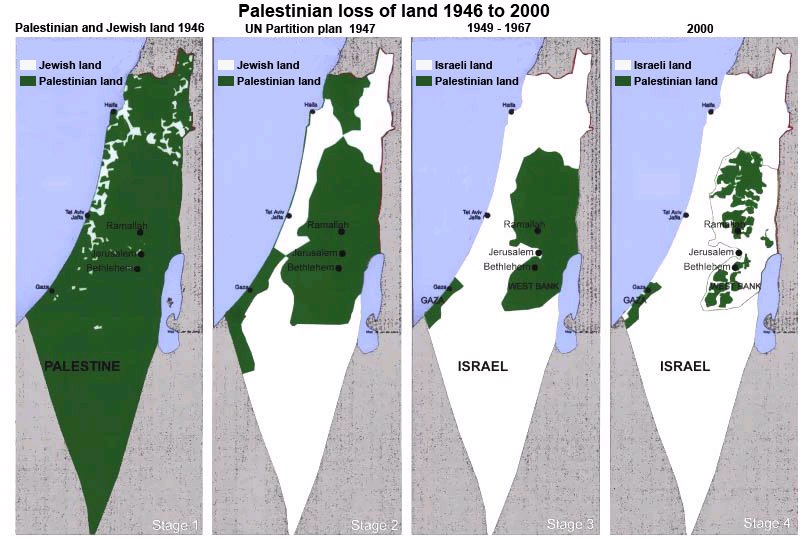
The HyperTexts




























